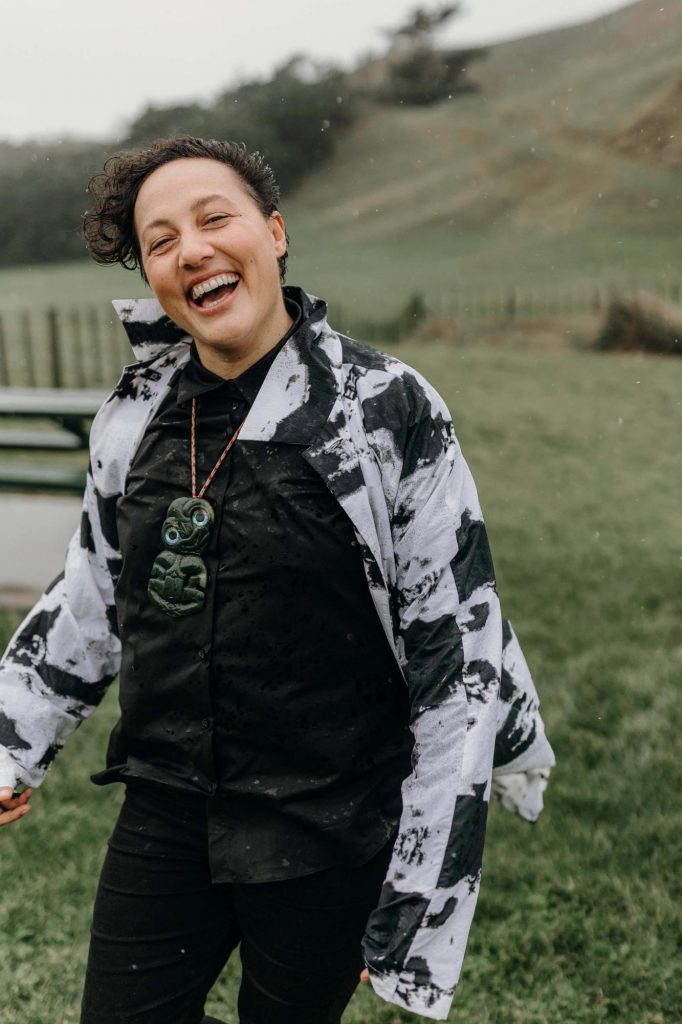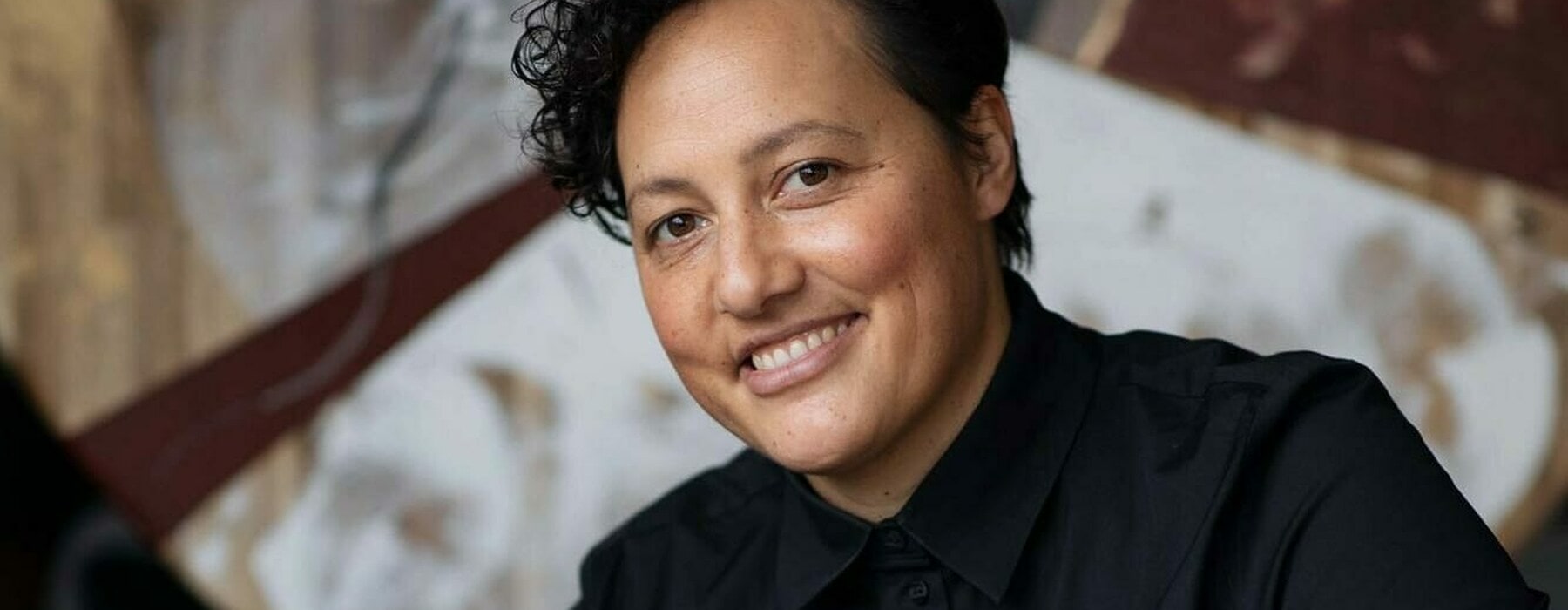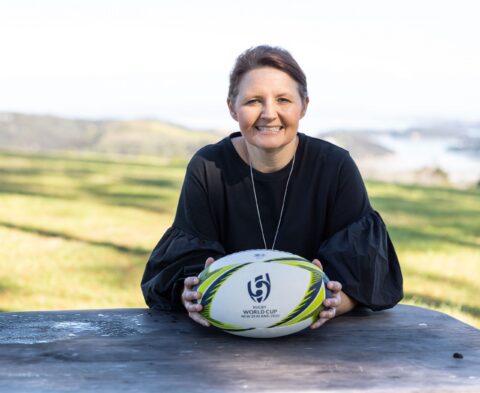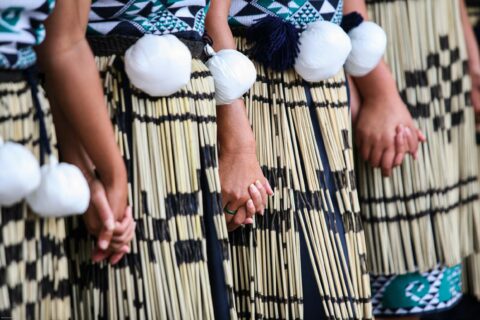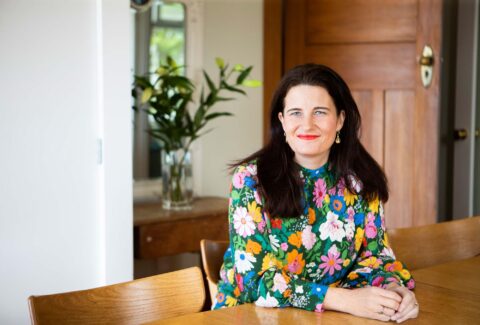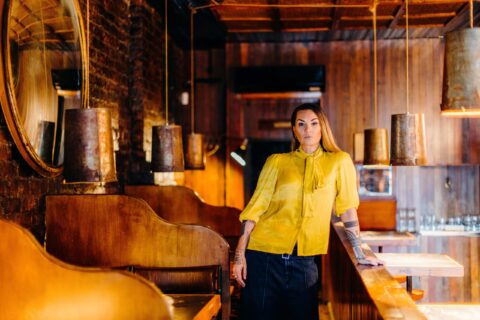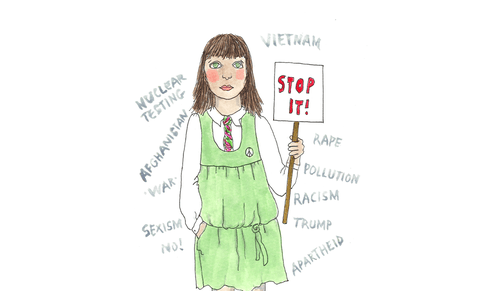After undergoing nine gruelling weeks of treatment for cervical cancer, Labour MP Kiritapu Allan is heading back to the Beehive. She opens up to Siena Yates about her painful journey and how love is helping her heal.
It was a quiet day in March when Labour MP Kiritapu Allan found herself with a pen in hand, writing a list she never dreamed she’d have to make.
It was a list of life goals, and right at the top, simply stated, was being around to see her young daughter reach her 21st birthday. Only, the 37-year-old East Coast MP had just been diagnosed with stage three cervical cancer and suddenly, nothing was simple anymore.
“It tests you in every way, shape and form,” says the Minister for Conservation and Emergency Management. “You’re forced to confront death in a very tangible and practical way like, will I get to see my daughter turn five and start school?”
Only a week later, Kiri shared the news of her cancer diagnosis with the nation and officially stepped away from her parliamentary duties, but she continued to update her followers on social media as a harrowing nine weeks of radical treatment ensued, somehow still managing to post from her hospital bed in seemingly high spirits.
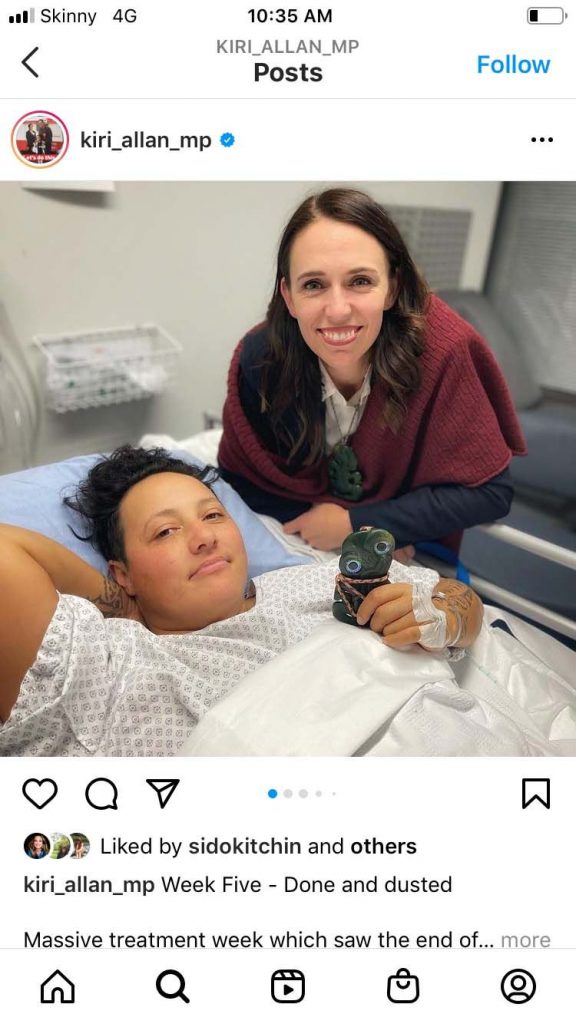
What didn’t make it to Instagram was just how difficult the experience truly was.
When Woman catches up with Kiri at her Gisborne home, the minister has barely been home for 48 hours, having gone straight from her Wellington hospital room to the airport, to put some distance between herself and the ordeal as soon as possible.
“As soon as I left, I kind of shut the door on that period, because it was so traumatic. It wasn’t even until this morning when I knew you were coming that I was like, ‘Oh, I’d better start reflecting on what that period actually was,’” admits Kiri.
“It was like this crazy, almost out-of-body experience where your life just goes ‘bang’, and it stops and is redirected into all of your personal resources – mental, spiritual, physical. And everyone around you, all of their resources are just totally sucked into this vortex of cancer and treatment as well.”
Today, Kiri’s feeling good and excited to return to work. Her body has responded well to the radical and “hardcore” treatment she’s undergone, which involved 25 external radiation sessions – one every weekday – as well as daily chemotherapy, before moving into “quite invasive” internal radiation sessions.
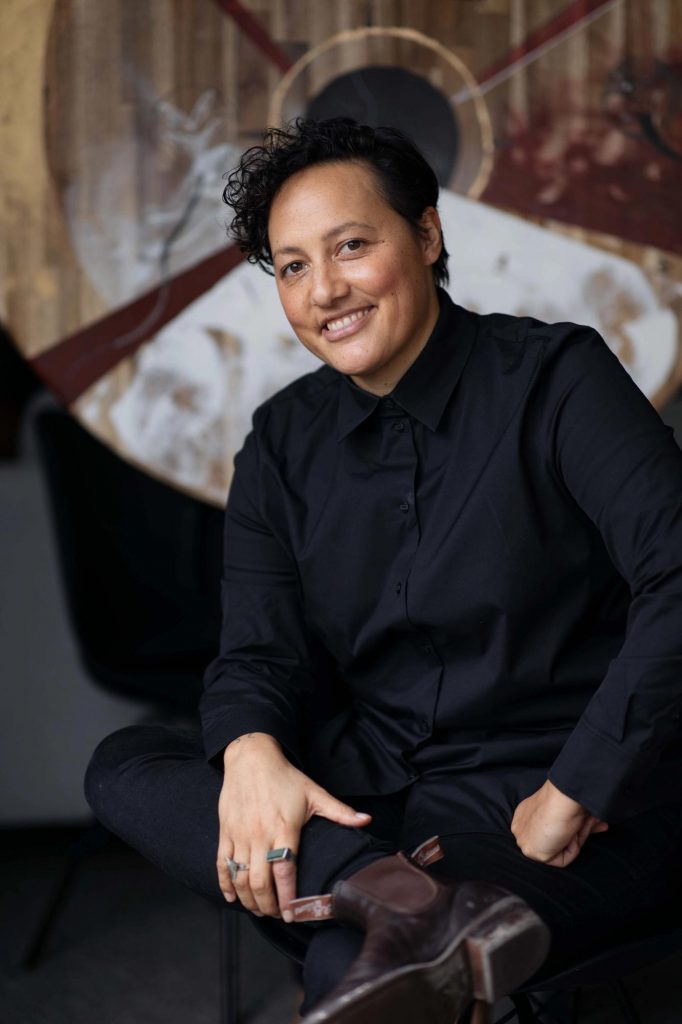
PHOTO BY JAMIE WRIGHT
It’s not quite the all-clear – that won’t come for many years, such is the nature of cancer – but it’s a tick of approval that, for now, means she can finally get on with her life.
“I’m stoked,” says Kiri. “Stoked that the pain is over. It’s actually a really painful experience but, you know, I didn’t put all that sort of stuff on social media, of course. It was really physically painful, and it was a really hard mental journey that tested my absolute parameters in terms of who you think you are and what you think you’re capable of. You’re forced to look at life in a completely different way and challenge everything you think you’ve got ahead of you, and really strip it right down like, ‘All right, you might not have that time, so now what?’ It was almost as hard mentally as it was physically going through the treatment.”
That’s saying a lot given the physical battle was debilitating. Kiri spent nine weeks basically in bed. There were times when her friends and family had to physically drag her around because her legs wouldn’t work. Times when she simply couldn’t bear to see anyone. Times when the only thing getting her through the pain was her support crew – lovingly dubbed “Kiri’s Angels” – singing hīmene (hymns) “over and over, louder and louder”.
“I was crook. I was really, really crook. Basically, everything that could go wrong during treatment unfortunately did, which is why it was supposed to be six weeks of treatment, but extended to nine. My body didn’t respond to a lot of the pain medication, so it was very painful,” says Kiri, explaining that she’s one of the unlucky few for whom morphine doesn’t work.
Even pre-diagnosis, throughout February and March, she was experiencing “incredible amounts of pain”, so debilitating that often she was spending entire days lying down, working from bed.
Then treatment commenced and “you’re just crook as guts”. But it worked, and Kiri’s oncologist was really pleased to see a marked reduction of her tumour.
It’s perhaps because the physical toll had a direct purpose and positive outcome that it was more manageable. The psychological stuff, however, was more difficult to come to terms with.
“It was such a traumatic period of everything stopping and having to confront all these life alternatives I didn’t think I would have to at my age. Work was cranking, everything was going well in life and I was really enjoying it. And then every facet of my energy was focused on just trying to make it through to the next day. Because there’s so much uncertainty, I went through these intense periods of being really angry at the situation. I didn’t want to face it. I didn’t want to think about it. I was just frustrated.”
There was even more anger when Kiri (Ngāti Ranginui, Ngāti Tūwharetoa) found out her chances of survival as a Māori woman were 27% lower than the average survival rate – something she discovered through her own research rather than from her doctors. Then there was further frustration when she couldn’t find out any more than that about what to expect as a wahine Māori, because the research simply doesn’t exist.
“When I was in the hospital, there were so many Māori in the ward I said at one point, ‘Goodness me, we need our own wharenui here because there’s so many of us!’” she laughs, but only briefly. “That’s actually been really challenging mentally, because I know I don’t have enough information to be able to help guide me in terms of what survival looks like, which has been such a big part of what’s pushed me to some really hard places, because I was walking into the unknown.”
As a mother, Kiri also had the added layer of having to figure out what to tell her three-year-old daughter, Hiwa-i-te-Rangi Rangitaia Ramarihi Allan-Coates, whom she co-parents with her ex-wife and “my best friend”, lawyer Natalie Coates.
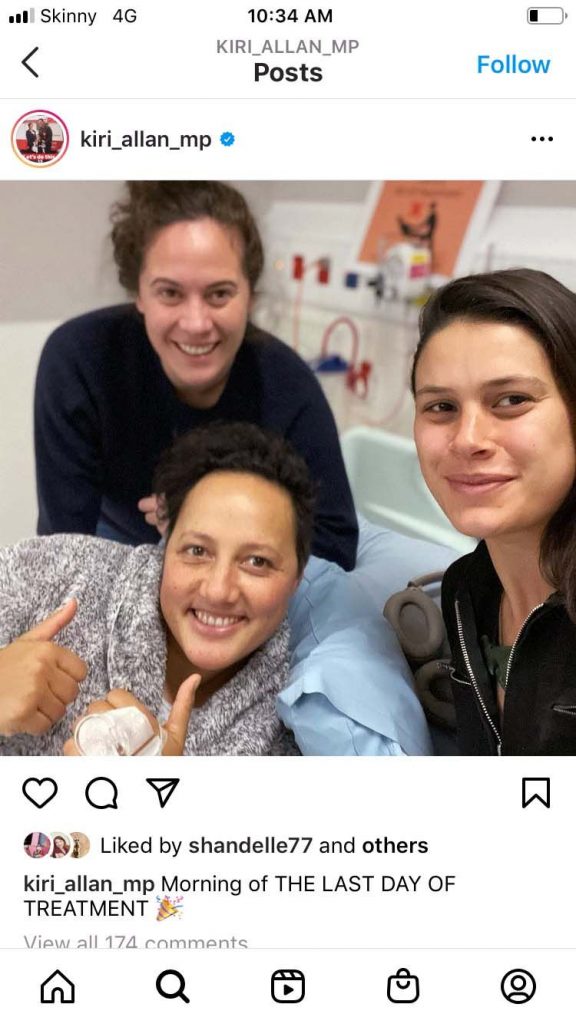
“It was hard making the call as to whether or not to let her see me when I was really crook in the hospital bed, being piped up to the bits and bobs. We decided we wouldn’t let her see me in the really, really poor stages, but we tried to let her be part of the journey because we didn’t know what the outcomes would be and we wanted her to be across it,” says Kiri.
“I don’t think we used the word cancer in front of her, we’d just talk about having a sickness in my stomach and my back, and we’d talk about the doctors that were there to try and help Mum get better.”
Hiwa-i-te-Rangi, whose first language is te reo Māori, was there when Kiri got a lot of the initial scans and tests, and she was in the room when her mum received her diagnosis.
“What was incredible to us is that she had this deep inner sense of wisdom that she knew something wasn’t right. She grabbed my hand and said, ‘Kei te pai koe māmā, hei konei ahau; it’s gonna be all right Mama, I’m here’.
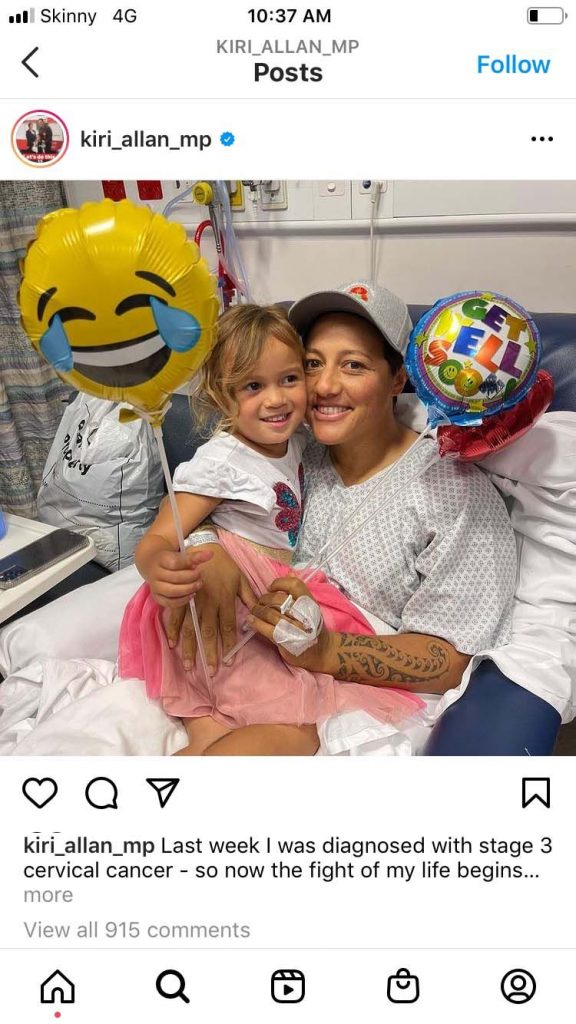
“It’s incredible, a kid’s wisdom. They know what’s up and they know when to hold your hand and be there – and she knew when to be a brat and when not to be,” Kiri says with a laugh.
Throughout it all, Kiri’s Angels have been there every step of the way. The core group comprises her parents, cousin, two of her closest friends, Natalie, and Kiri’s current partner, RNZ journalist Māni Dunlop, who also has a three-year-old daughter, Pikiarero Hazel. It’s this “tight inner circle” who flew in from around the country, squished mattresses together on the floor of Kiri’s “tiny” Wellington home and stayed with her through thick and thin. Throughout treatment, at least two of the angels were with her at all times, each with a role and carrying the weight of different parts of the journey.
“Those are the people that did the yards with me for the four months [since her diagnosis], and they gave up so much – more so than what I did! My job was just to show up at things and get them done, I was the pincushion,” says Kiri.
She’s been particularly thankful for Māni – who basically took the entire period off from RNZ, or was able to work remotely – and Natalie and her friends, because they were able to take the brunt of things that were too difficult for Kiri’s parents, Gail and David, to process.
“It’s a different thing for them. I think as a parent, the worst news you could ever hear is that your kid is crook – and really, really crook. I think that was, and probably is still, just a really hard thing for them to comprehend. The day we got the stage three diagnosis, my old man, he’s a Pākehā fulla, but I think he turned a different shade of white than I’d ever seen him,” says Kiri, who is one of 10 children and grew up in Paengaroa and Te Karaka, southwest of Gisborne. “I was really lucky to have my peers, who could be there intimately on the day-to-day stuff, because I think it would have been really hard for Mum and Dad to have to carry that. I could see that it really hit them.
“So having the angels, I felt very privileged, I was immeasurably blessed. I see a lot of people go through it by themselves; a lot of people don’t tell their families or let their colleagues or anybody know. Sometimes you’d hear people receiving very hard diagnoses through this thin veil of a hospital curtain, and you kind of want to wrap everybody up with a big massive hug and just hold them, because it’s pretty scary. I know I’m very lucky because not everybody has that support. I’ve become pretty grateful for what I’ve got in life.”
I see a lot of people go through it by themselves… You kind of want to wrap everybody up with a big massive hug and just hold them, because it’s pretty scary
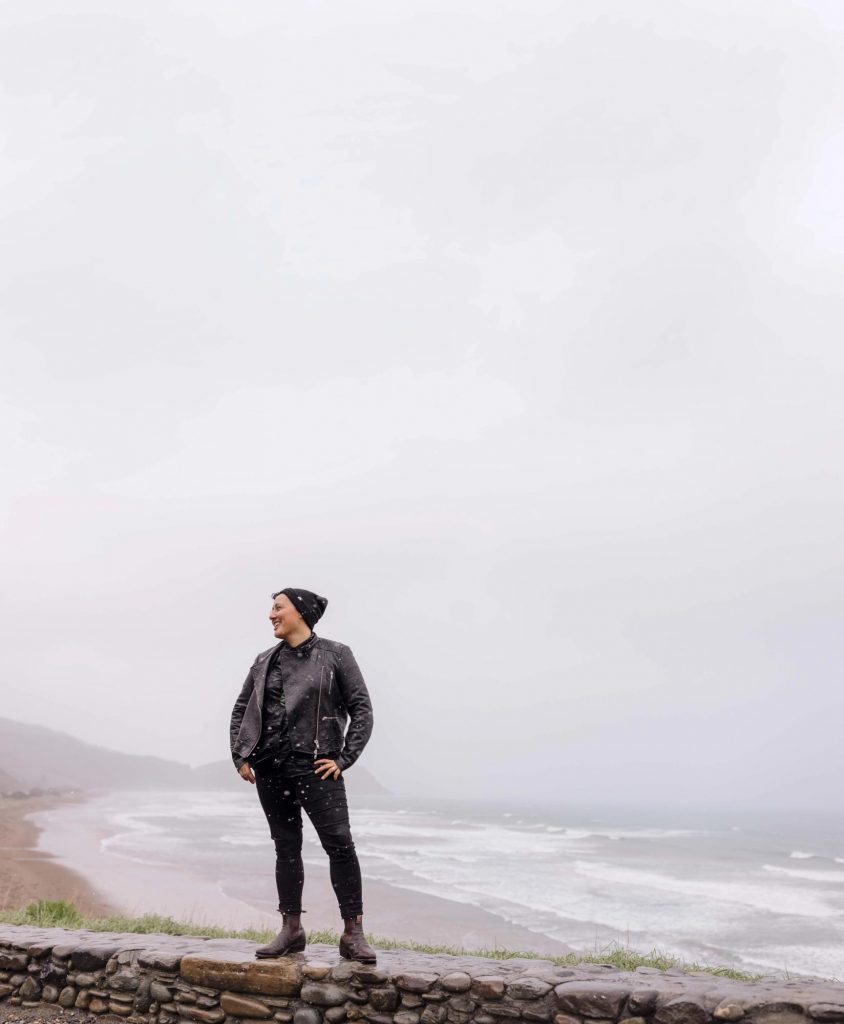
From the very beginning, it was a close friend and colleague, Labour MP Dr Ayesha Verrall, who encouraged Kiri to go and get the scan that led her to her diagnosis. She’d been experiencing pain for weeks, and then in January, she started bleeding and it didn’t stop.
She went to the doctor, but very little came of the visit, and – being someone who generally avoids the doctor, and especially avoids talking about “things down there” (although now, she adds with a jokingly proud nod, “I’m quite comfortable saying the word vagina”) – she was prepared to carry on as normal, even though things were far from it. It wasn’t until she was on a work trip and had to urgently use the bathroom that the seriousness of her condition hit her.
“I ducked into a toilet and the next 30 or 40 minutes were quite terrifying because I didn’t know what was happening with my body. I was like, ‘Something’s really not right here. I’m quite scared’. It was like my whole insides were just falling out – and this is after already having four or five weeks of menstruating.”
Eventually, she asked Ayesha for some advice and was immediately – and quite resolutely – told to go for a scan.
“I don’t like going to doctors in the first instance, so to get there was a big step – going back was really not an option. But having my colleague sit me down and scare the living daylights out of me and say, ‘You have to do this’, and being very stern with me… If not for her doing that, I know myself, and there’s no way I would have gone back.”
That’s exactly why Kiri decided early on to take her cancer battle public and be as open and transparent as possible – because she knows hundreds of people like her who avoid the doctor and don’t like to talk about such personal things, even when they know something’s not quite right.
“I thought I had an obligation to be free and frank in this journey and, hopefully, it might just save one or two other people,” she says. “Because you don’t want to have a Kiri or a Talei [Morrison, who spearheaded the #SmearYourMea campaign after her diagnosis] once every three years getting diagnosed with cancer to provide a shockwave for folks that look like us, sound like us and will do anything but walk down to the doctor when they’re feeling crook.”
Ever since then, Kiri’s had non-stop correspondence from people around the country reaching out for help and support at various stages of their own health journeys, from people who’ve been checked and cleared, to people who’d received terminal diagnoses. And the whole time, she’s been emailing, messaging and calling them all back.
“All you can do is share your own experiences, acknowledge the fear, because it’s scary as heck, demystify the stages in the system, and just hold as many hands as you can.”
All you can do is share your own experiences… and just hold as many hands as you can
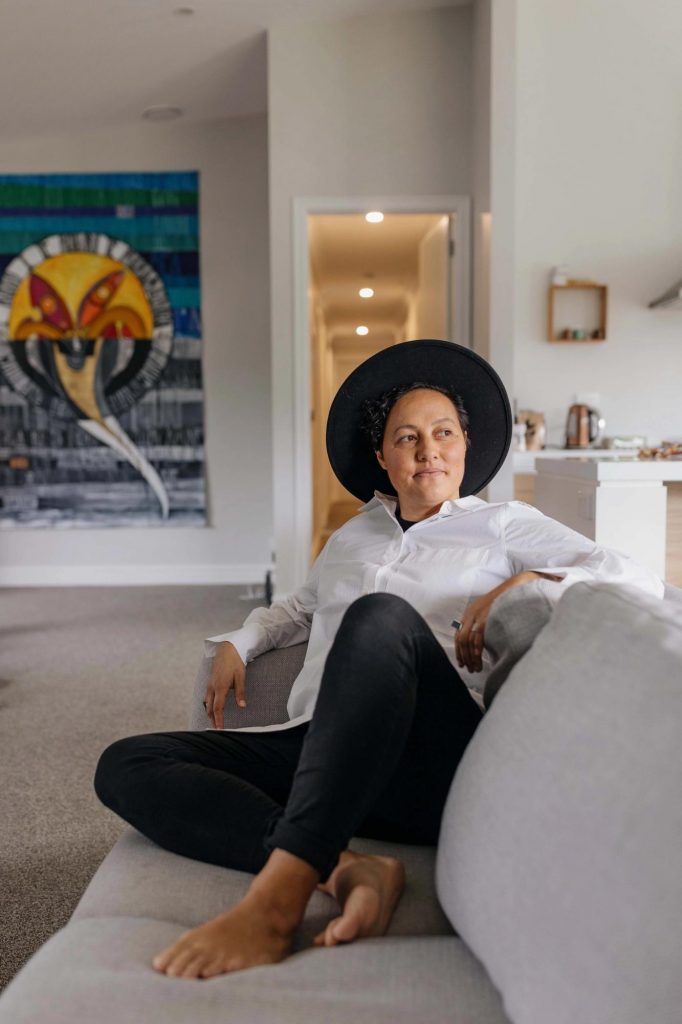
It seems a lot to take on while still going through all the hard yards yourself, but Kiri’s outlook is simple. “We’re all part of the sisterhood, right? And if a sister puts their hand up and says that they need help, and you have the ability and the capacity to help them, then you do.”
It’s easy to worry about Kiri taking on too much. From the moment you meet her it’s glaringly obvious that life in the fast lane is the only life she knows or wants. She is – remarkably, after everything – full of energy, joy and passion and, just days after leaving hospital, she’s raring to get back into work.
If she’d had it her way, she wouldn’t have stopped working at all, and for a time she didn’t, even when she should have. On a friend’s phone, there’s a photo of Kiri at the women’s clinic on a bed with her feet in stirrups having biopsies taken. She has her headphones in and her iPhone by her head, taking a media call on the morning of the March 5 tsunami. Hours later, she was fronting a media conference about the civil emergency and evacuations.
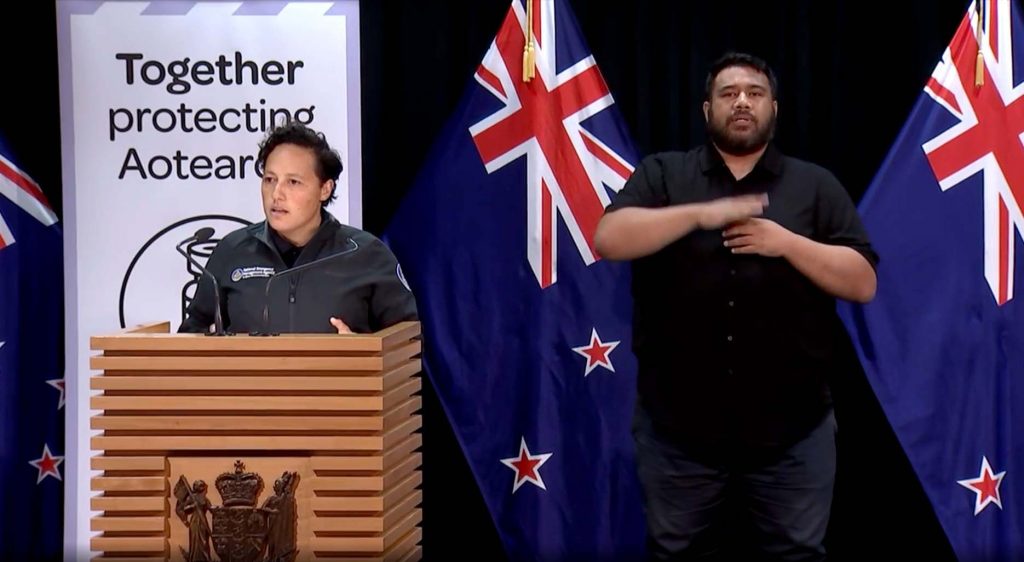
It’s not that Kiri is a workaholic, it’s simply that she loves what she does and has so much she wants to achieve. She’s come a long way since she left Auckland Girls’ Grammar School in sixth form to work at KFC, then Rebel Sport. After travelling the country doing various jobs – construction, bar work, beekeeping, cherry picking – she started tertiary studies at 18 at Auckland’s Unitec, with a course in reo and tikanga, before heading to Victoria University of Wellington to study law and politics. She became involved with the Labour Party at 18, and after a legal career, entered the House as a list MP in 2017, before winning the East Coast electorate in 2020. In many ways, her political career has only just begun.
“I think my philosophy in life has always been ‘go hard or go home’. So, while I’ve got the tick that I’m doing all right for now, I’m here to give it my all. And if and when that changes, cool, we can reassess at that point. But I’ve had this crazy, invasive treatment that nearly blimmin’ kills you, and I’m not dead. I feel like I came pretty close to being knocked out there for a bit, but I’ve still got enough gas in the tank to be able to make a difference while I’m still here. Life’s starting to feel a lot more normal now, and it’s starting to feel pretty good.”
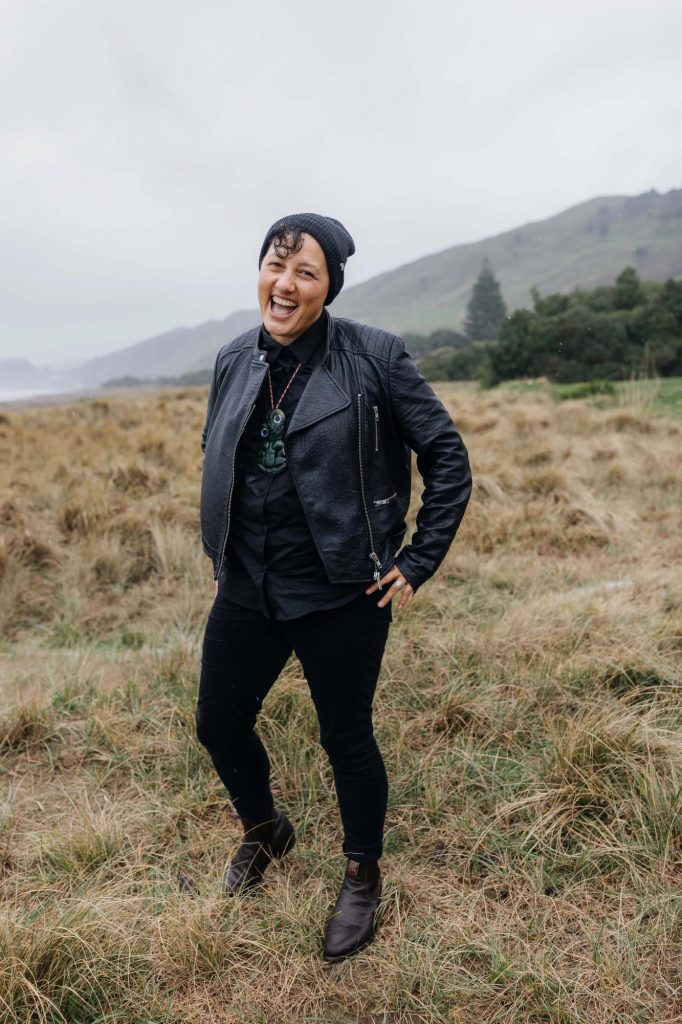
Kiri’s working hard to rebuild muscle, strength and energy in preparation for the long hours her job requires. “Your days start at 7am and, at bare minimum, finish at 10.30pm. When I go back into that environment, I need to be clear within myself that I can manage that workload and do the role justice. That’s also been a part of post-recovery, being able to test those parameters.”
She’s been working hard at listening to her body and knowing when she has energy to give and when she doesn’t, and honouring those signals instead of pushing herself.
Even when it came to her hospital social media updates, she points out there was a period of about a month where she didn’t post, simply because she couldn’t.
“I was really in the doldrums. I felt very, very poorly, had zero energy, was angry at my body for not being able to be stronger and cope with things. When you feel disappointed or angry with your body and it’s not performing as you expect, there can be a lot of processing in that, so I went pretty quiet and cut everyone off. It was just this phase of like, shut and lock the doors. I didn’t have a lot of energy in the tank to give out. But then,” she says, “when I was ready to, I was ready to. And that’s what I mean about getting to know your parameters.”
When it comes to returning to work, Kiri sums things up by explaining that she’s always maintained that if she ever won Lotto, she’d still show up at work first thing the following morning.
“I genuinely feel incredibly privileged to have my job and that while I have the opportunity to make change, I need to go hard or go home. Being a cabinet member means I have the extraordinary ability to shape policy and there is a direct correlation between decisions that we make and how they impact real lives right here. And so, while I have that opportunity to be at the table, I’ll be damned if I don’t do anything and everything in my power to impact change for the better for folks that look like me and that grew up in places like we did. That’s what drives me.”
I’ll be damned if I don’t do anything and everything in my power to impact change for the better
It’s a drive that has taken on a whole new layer now that she’s returned home to Gisborne after weeks away for treatment, and she’s realised just how connected people are to her story.
“Coming back and walking along the streets, or just going to the supermarket, people physically want to touch me – they feel like I’m their niece or their moko. It doesn’t matter whether they’re old, young, white, brown, National voter, Labour voter or anybody else. That’s something I actually had to quickly get used to when I came back – just how much people were really invested in a different way.
“It’s weird for a politician to have a different kind of connection with people, other than through politics. I had no idea that would become a thing, but I’d shared something so personal – and cancer’s something that impacts every single family in some way at some point in time, so it’s something that people could relate to.”
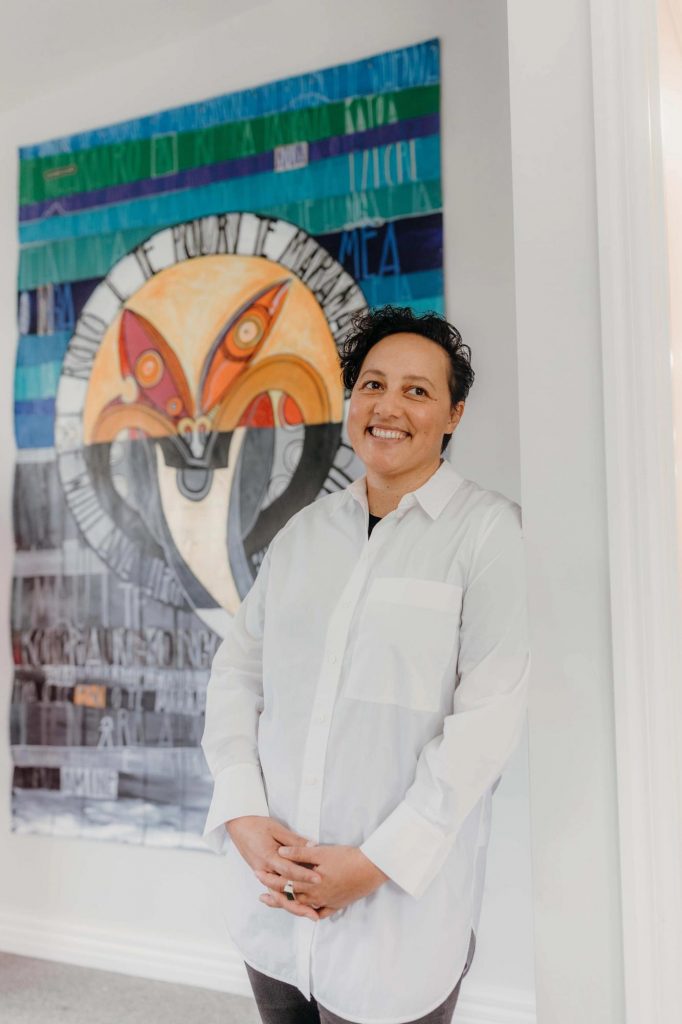
PHOTO JAMIE WRIGHT
While she’s committed to her work and her people, Kiri says her cancer experience has changed her “immeasurably”, most notably in how she looks at life and her priorities. She, like so many others, has become used to living a life of service.
“In Māoridom, we call it ‘on the kaupapa’. It can be relentless, but it also gives you your sense of purpose, identity and meaning. I think a major takeaway is to always take the time to be grounded enough to check in with where I’m really at physically, mentally and spiritually, and when things are out of balance, to quickly take the time to work out what I need to do to restore the balance – particularly with health,” she says.
“It can kind of feel quite selfish taking time out to take care of yourself, but that’s been a massive realisation – that I’ve got that round the wrong way. It’s a massive service that you give to yourself by letting yourself be well and not ignoring symptoms or signs. And by servicing yourself in the best way that you can, you’re actually, in turn, giving the most of yourself to your community, your family, your people.
“What that means for living life is it’s a slightly different hierarchy of priorities – but there’s always that little person that comes right at the top of my list.”
